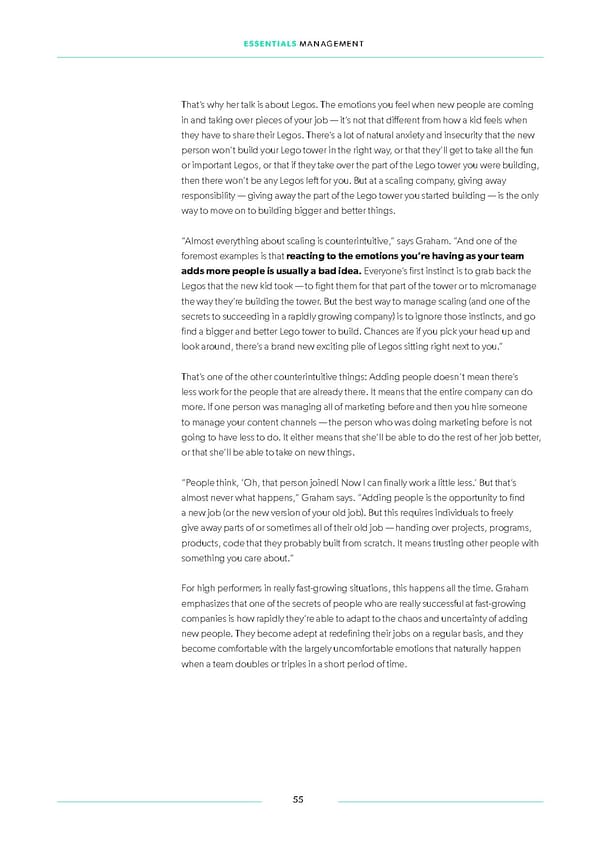ESSENTIALS MANAGEMENT That’s why her talk is about Legos. The emotions you feel when new people are coming in and taking over pieces of your job — it’s not that different from how a kid feels when they have to share their Legos. There’s a lot of natural anxiety and insecurity that the new person won’t build your Lego tower in the right way, or that they’ll get to take all the fun or important Legos, or that if they take over the part of the Lego tower you were building, then there won’t be any Legos letf for you. But at a scaling company, giving away responsibility — giving away the part of the Lego tower you started building — is the only way to move on to building bigger and better things. “Almost everything about scaling is counterintuitive,” says Graham. “And one of the foremost examples is that reacting to the emotions you’re having as your team adds more people is usually a bad idea. Everyone’s ifrst instinct is to grab back the Legos that the new kid took — to ifght them for that part of the tower or to micromanage the way they’re building the tower. But the best way to manage scaling (and one of the secrets to succeeding in a rapidly growing company) is to ignore those instincts, and go ifnd a bigger and better Lego tower to build. Chances are if you pick your head up and look around, there’s a brand new exciting pile of Legos sitting right next to you.” That’s one of the other counterintuitive things: Adding people doesn’t mean there’s less work for the people that are already there. It means that the entire company can do more. If one person was managing all of marketing before and then you hire someone to manage your content channels — the person who was doing marketing before is not going to have less to do. It either means that she’ll be able to do the rest of her job better, or that she’ll be able to take on new things. “People think, ‘Oh, that person joined! Now I can ifnally work a little less.’ But that’s almost never what happens,” Graham says. “Adding people is the opportunity to ifnd a new job (or the new version of your old job). But this requires individuals to freely give away parts of or sometimes all of their old job — handing over projects, programs, products, code that they probably built from scratch. It means trusting other people with something you care about.” For high performers in really fast-growing situations, this happens all the time. Graham emphasizes that one of the secrets of people who are really successful at fast-growing companies is how rapidly they’re able to adapt to the chaos and uncertainty of adding new people. They become adept at redeifning their jobs on a regular basis, and they become comfortable with the largely uncomfortable emotions that naturally happen when a team doubles or triples in a short period of time. 55
 Essentials Management First Round Capital Page 54 Page 56
Essentials Management First Round Capital Page 54 Page 56